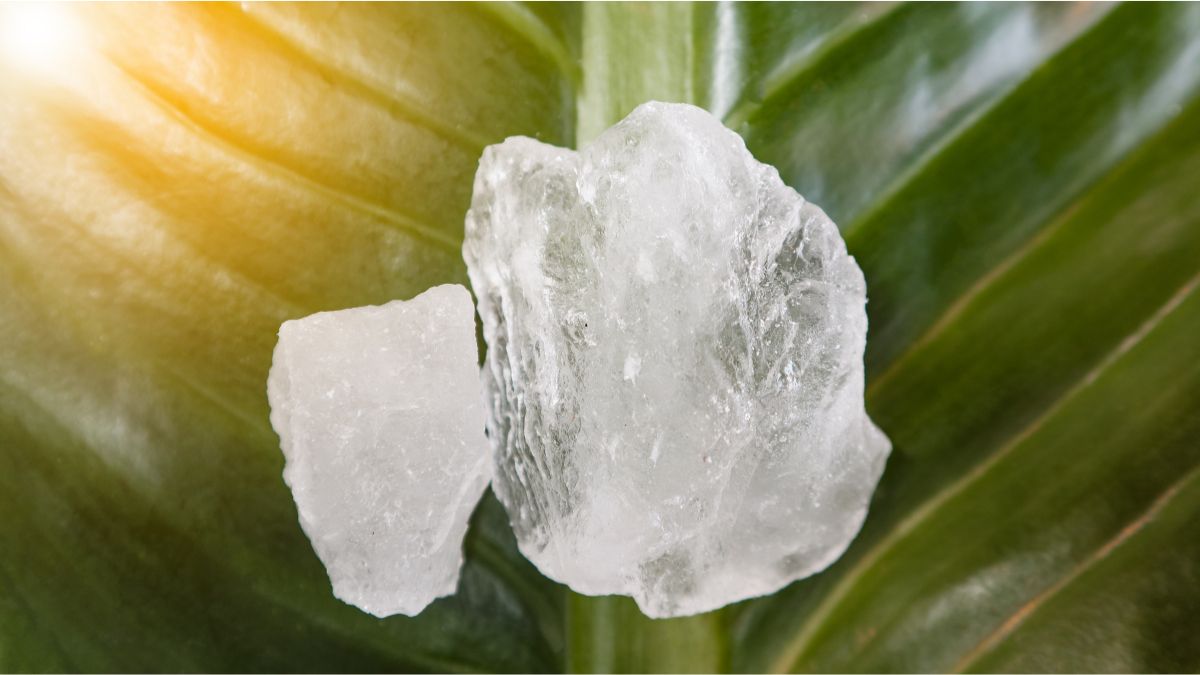Alum stone, also known as potassium alum or potash alum, is a naturally occurring mineral compound that has served humanity for thousands of years. This versatile substance, with its crystalline structure, offers several benefits across personal care, health, and household uses. In this article, we will explore alum stone in-depth, covering its uses, benefits, and various other aspects to understand why this ancient mineral continues to be popular today.
What is Alum Stone?
Alum stone is a naturally occurring mineral that belongs to a class of compounds known as double sulfates. Chemically, it is a hydrated potassium aluminum sulfate with the formula KAl(SO₄)₂·12H₂O. It typically forms in clear, colorless, or white crystals. It has a wide range of uses due to its antimicrobial properties, astringency, and ability to act as a coagulant.
Types of Alum
Alum comes in several types, including:
- Potassium Alum (commonly referred to as alum stone)
- Ammonium Alum
- Sodium Alum
- Chrome Alum
Each type of alum has different uses, but potassium alum is the most commonly used form in personal care, food preservation, and water treatment.
Key Uses of Alum Stone
Alum stone has a broad array of applications, from cosmetics to water purification. Let’s examine its most notable uses:
1. Personal Care and Beauty
People widely use alum stone in personal care products because of its antiseptic and astringent properties.
- Deodorant: Alum kills bacteria that cause body odor, which makes it a popular choice for natural deodorants. Applying it directly to the skin after a shower provides long-lasting odor control.
- Aftershave: Many people use alum stone as an aftershave treatment. It tightens pores, soothes minor cuts, and reduces irritation caused by shaving. Its antiseptic properties also help prevent infection.
- Facial Toner: Alum works as a natural astringent, tightening and toning the skin. You can find it in DIY facial masks or use it as part of homemade skincare treatments.
2. Food Preservation
Alum stone has a long history in food preservation, particularly for pickling. It helps maintain the crispness of vegetables and fruits.
- Pickling: Alum stone prevents the breakdown of pectin, the substance that gives fruits and vegetables their firmness. It ensures that pickled items remain crisp for longer.
- Baking: Some bakers add alum to certain recipes, such as in leavening agents, to create a desired texture in baked goods.
3. Water Purification
Alum plays a key role in water purification due to its ability to work as a coagulant, removing impurities by clumping them into larger particles that can be filtered out.
- Clarifying Water: In municipal water treatment plants, experts use alum to clarify drinking water. It binds to suspended particles, allowing them to settle at the bottom of the water source.
- Emergency Water Purification: During emergencies, you can use alum to purify water. A small amount of alum added to muddy water will help clear it, making it safer to drink.
4. Antiseptic and Healing Properties
Alum stone is prized for its antimicrobial and antiseptic properties. People have traditionally used it for wound care and to treat mouth ulcers.
- Mouthwash: Alum can be used in mouthwash formulations to combat bacteria and prevent infections in the mouth.
- Minor Cuts and Abrasions: Rubbing alum directly on small cuts and abrasions can help prevent infection and speed up healing.
5. Industrial and Household Uses
Besides personal and health applications, it also serves in industrial and household functions:
- Dye Fixative: Alum serves as a mordant in the textile industry, helping to fix dyes to fabrics.
- Cosmetics: The cosmetics industry uses alum in various formulations as an emulsifier, stabilizing agent, and preservative.
- Cleaning Agent: People also use alum to remove stains from fabrics and clean surfaces.
Health Benefits of Alum Stone
1. Antimicrobial Properties
One of alum’s most important benefits is its natural antimicrobial properties. It effectively prevents bacterial infections, especially when used in products like aftershaves, deodorants, or mouthwash.
2. Astringent Effects
Alum’s ability to tighten tissues makes it a useful astringent. It helps reduce pore size, prevent excessive sweating, and tone the skin. These benefits make it especially effective in treating acne and other skin conditions.
3. Wound Healing
Alum stone promotes the faster healing of minor cuts and wounds. It reduces bleeding and prevents bacterial infections, speeding up the recovery process.
4. Oral Health
Alum extends its antiseptic benefits to oral health. It helps reduce mouth ulcers, sore throats, and bad breath. Gargling with a solution containing alum can aid in fighting mouth infections.
Potential Side Effects and Considerations
While the stone provides many benefits, there are some potential side effects and considerations to keep in mind:
- Skin Sensitivity: Some individuals may be sensitive to alum when applied to the skin. Always conduct a patch test before using it regularly.
- Ingestion Risks: Alum is generally safe when used externally, but ingesting large quantities can be harmful. Avoid consuming alum excessively, especially in food.
- Pregnancy and Breastfeeding: Pregnant or breastfeeding women should consult with a healthcare professional before using alum, as its safety in these conditions has not been thoroughly studied.
Table: Comparison of Alum Stone Types
| Type of Alum | Common Uses | Chemical Composition | Main Benefits |
|---|---|---|---|
| Potassium Alum | Deodorants, aftershave, pickling | KAl(SO₄)₂·12H₂O | Antiseptic, astringent, food preservation |
| Ammonium Alum | Water treatment, food preservation | NH₄Al(SO₄)₂·12H₂O | Water purification, coagulant |
| Chrome Alum | Leather tanning | CrAl(SO₄)₂·12H₂O | Leather processing, dye fixing |
| Sodium Alum | Cosmetics, textile industry | NaAl(SO₄)₂·12H₂O | Stabilizer, emulsifier |
FAQs about Alum Stone
- What is alum stone used for? Alum stone serves in personal care products, food preservation, water purification, and as an antiseptic.
- Is it safe for the skin? Yes, alum stone is generally safe for skin use, but individuals with sensitive skin should perform a patch test first.
- Can alum stone be ingested? Alum is safe in small amounts for food preservation, but excessive ingestion may be harmful.
- How does it help with acne? Alum works as an astringent and antimicrobial agent, helping to tighten the skin and prevent bacterial growth, which is useful in acne treatment.
- Can alum stone be used for water purification? Yes, alum clarifies and purifies water by removing impurities, making it safer for drinking in emergencies.
- How long does alum stone last? It is durable and can last for months or even years, depending on how frequently you use it.
Conclusion
Alum stone, a mineral with ancient roots, remains a versatile and valuable resource today. From personal care and health benefits to industrial applications, alum stone proves its worth in many areas. While it offers numerous advantages, it’s important to use alum with care, especially in relation to sensitive skin or large-scale consumption. Whether you use it as a deodorant, skin toner, or food preservative, it continues to be a practical and reliable solution for everyday needs.










